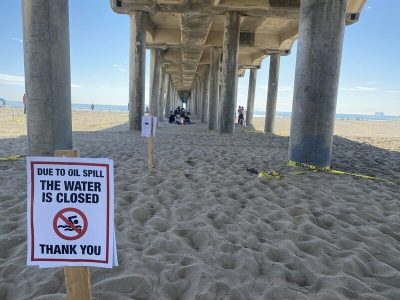Legal Agreement Requires U.S. to Re-Examine Harms to Whales From Pacific Offshore Oil Drilling

All Global Research articles can be read in 51 languages by activating the “Translate Website” drop down menu on the top banner of our home page (Desktop version).
To receive Global Research’s Daily Newsletter (selected articles), click here.
Follow us on Instagram and Twitter and subscribe to our Telegram Channel. Feel free to repost and share widely Global Research articles.
***
The Center for Biological Diversity, Department of the Interior and National Marine Fisheries Service reached an agreement today that requires the agencies to re-examine the risks and harms to whales and other endangered species from continued oil and gas drilling in federal waters off California.
Today’s agreement resolves a lawsuit filed by the Center earlier this year following a October 2021 oil spill from a subsea pipeline off Huntington Beach.
“We’re glad federal officials have agreed to reconsider offshore drilling’s harms to California’s amazing but vulnerable marine creatures,” said Kristen Monsell, oceans legal director at the Center. “Decade after decade, oil spill after oil spill, the federal government has failed to properly examine how offshore drilling threatens endangered whales and other animals. A comprehensive, science-driven analysis should show that drilling off California is just too risky to wildlife and our climate and must be phased out.”
Under the agreement’s terms, the agencies must complete a new analysis that accounts for new information related to the recent oil spill. They must consider how offshore-drilling activity affects newly designated critical habitat for Pacific humpback whales and consider implementing certain mitigation measures, such as requiring oil and gas vessels to slow down to avoid striking and killing whales and other animals.
The Trump administration completed the existing Endangered Species Act analysis for oil and gas activity off California’s shores in 2017. It was the first consultation on drilling activities off California completed in more than 30 years.
That Trump-era analysis concluded that drilling off the state’s coast would not adversely affect threatened and endangered whales, sea turtles or other species. It based its conclusion on the assumption that an oil spill is unlikely and that if it did occur it would be limited to 8,400 gallons. The Center’s lawsuit highlighted how last year’s oil spill off California, which was several times larger than the Trump-era estimate, renders that whole analysis unlawful.
The Center’s lawsuit also asserted that the existing analysis is not based on the best available science. The analysis failed to consider new information on the threat to whales of being hit by ships engaged in oil and gas activity; it also didn’t consider how existing oil drilling worsens the climate crisis and affects newly designated critical habitat for humpback whales.
The agreement requires the agencies to complete the new analysis within one year.
*
Note to readers: Please click the share buttons above or below. Follow us on Instagram and Twitter and subscribe to our Telegram Channel. Feel free to repost and share widely Global Research articles.
Featured image: Huntington Beach oil spill. Please credit: Wendy Leung / Center for Biological Diversity. Image is available for media use.

